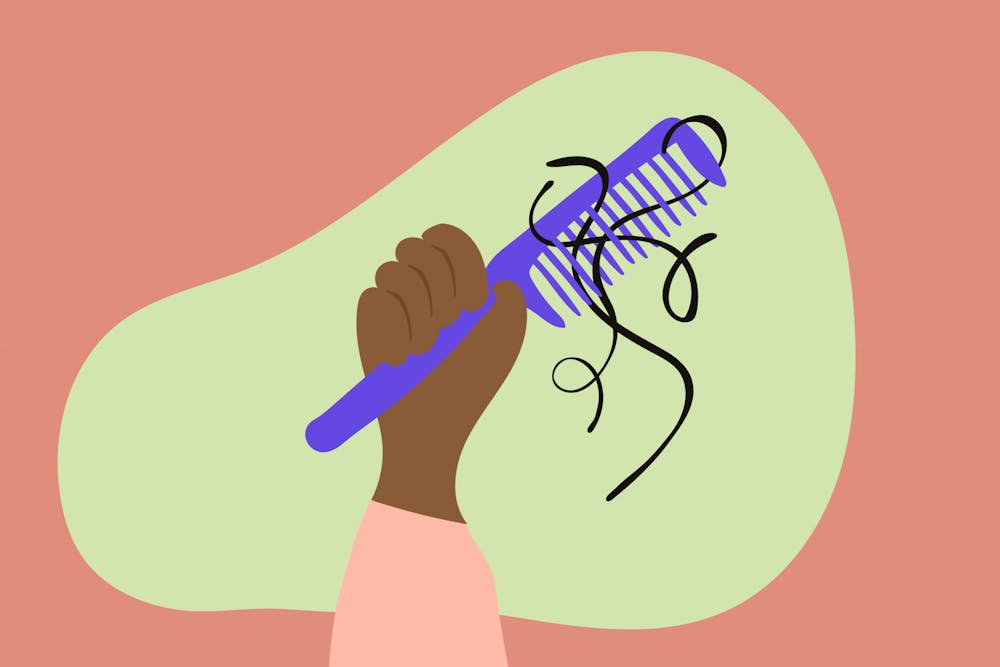For some people, combing through their luscious locks brings on shedding and subsequent fear of hair loss and social isolation. Genetics can feel cruel and hair loss creeps up when people least expect it. Many individuals don’t anticipate experiencing hair loss or thinning in their youth, but for some, it’s an unavoidable reality. Present day ageism and judgemental attitudes only create further burdens to the experience of hair loss. It’s time to embrace our best selves, regardless of the cosmetic cards we’ve been dealt.
For most people hair loss is unavoidable. Sixteen percent of men will start losing their hair around the ages of 18 to 29 and 12 percent of women will experience hair loss around the age of 29. By 49 years old, the percentage of those with hair loss balloons to 53 percent in men and 25 percent in women.
There are a variety of reasons why someone may be experiencing hair loss (alopecia). But the most common cause is genetic. In this instance, one’s hair follicles are more sensitive to interactions with hormones like dihydrotestosterone (DHT) and testosterone, eventually causing hair thinning and balding. However, hair loss isn’t solely caused by genetics.
Other factors contribute to hair loss, including hormonal imbalances, medical conditions, lifestyle, and simply aging.
Your response to hair loss might be—who cares? It’s just hair. Although it’s just hair, its loss can be devastating.
On average, people might regard hair loss as inconsequential, responding with, “who cares? It’s just hair.” Although, yes, it’s just hair, any kind of external change can be unsettling and in some cases devastating. One study observes the catastrophic, psychological impacts for Alopecia Areata patients experiencing sudden, patchy hair loss on more than 50 percent of their head. Many patients reported feeling depressed, anxious, and more inclined to avoid social situations. While studies and data clearly prove the significance of hair in self–perception and consequently overall happiness, real anecdotes from fellow Penn students highlight the everyday experiences of peers your age
Terry* (C’ 24) has experienced hair loss from an early age and testifies to the emotional distress he experiences while undergoing these unexpected physical changes, particularly in this period of young adulthood.
“Hair is definitely valuable and something you shouldn’t take for granted. At some point in men’s lives, they will deal with hair loss in some capacity but you don’t expect it to be early on. In my developmental years, like late high school and early college … it impacted my self–confidence and willingness to put faith in myself,” says Terry.
College marks a transformative period in young adulthood, and the stress and anxiety caused by hair loss compound the challenges young folks face in this unique experience. In both men and women, thick and full hair is often associated with youth and attractiveness. To young people, a full head of hair seems just as promised as a sharp mind and healthy body. A receding hairline is distinctly an old person issue that many young people choose to ignore—as if old age doesn’t come for us all. When you lose your hair you feel more vulnerable to judgment and unsolicited questions, and for young folks feeling alienated because of your appearance can be heartbreaking and painful.
Luckily—or unluckily depending on perspective—there’s a plethora of crisis management options to address hair loss. Pills and creams with sterile names like Finasteride, Minoxidil, and Rogaine promise to bring hair back, provided that one commits to lifelong use of their product. Or, another option is to save up for hair transplant surgery like allegedly Elon Musk and Lebron James. Lastly, if the other options are out of reach, you can always use semi–permanent methods like hair fiber, extensions, and toupee to fill in the gaps. But regardless of the promised results, the internal emotional toll associated with the uncertainty of hair loss lingers for many.
“I’ve been on Propecia and Rogaine … I’ve been on those for the past two years now. … It’s hard to tell the effectiveness of drugs … my hair loss has progressed and I don’t know how it would have progressed without the medication,” says Terry.
Although hair loss drugs help, they aren’t a perfect solution, regardless of how they might market themselves to consumers.
“I realized that it was a bigger thing in my head than to everyone else … I’ve learned to accept that there’s not much I can do to change things. It doesn’t matter to me as much anymore,” says Terry.
Regardless of whether or not individuals are directly impacted by hair loss, they should accept it as natural element of the human condition. Perhaps hair loss isn’t intrinsically something that should be hidden and changed. Let’s be clear that it’s your prerogative what you do with your hair. However, people should feel comfortable existing in their own body without feeling as though they need to alter their appearance to accommodate cosmetic norms. It’s possible that your thinning hair or receding hairline fade into the background if not for real or perceived judgmental stares and comments.
The stigma surrounding hair loss is deeply rooted in ageism and a fear of appearing older. The natural processes of aging shouldn’t be so deeply stigmatized and resisted. Just as wrinkles are a natural byproduct of aging, hair thinning and loss is also a natural occurance. It might not be ideal to undergo this transition at any age, but it isn’t shouldn’t make people feel as though they are alienated because of it. Instead, it’s an opportunity to embrace your appearance in whatever form it takes on, irrespective of hair. Remember that while hair isn’t nothing, it isn’t everything either.
*Names have been changed to preserve anonymity.







